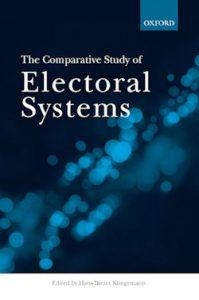Note: The following announcement was sent to the CSES email list. To receive notices like this one by email, please join the CSES email list using our convenient web form. Or, send an email to [email protected] and let us know you would like to join.
Book Release:
The Comparative Study of Electoral Systems, edited by Hans-Dieter Klingemann
We are pleased to announce a Oxford University Press book series that is based on the Comparative Study of Electoral Systems (CSES).
The first volume, The Comparative Study of Electoral Systems, edited by Hans-Dieter Klingemann, is available on the Oxford University Press website.

| Book Description:
Citizens living in presidential or parliamentary systems face different political choices as do voters casting votes in elections governed by rules of proportional representation or plurality. Political commentators seem to know how such rules influence political behaviour. They firmly believe, for example, that candidates running in plurality systems are better known and held more accountable to their constituencies than candidates competing in elections governed by proportional representation. However, such assertions rest on shaky ground simply because solid empirical knowledge to evaluate the impact of political institutions on individual political behaviour is still lacking. The Comparative Study of Electoral Systems has collected data on political institutions and on individual political behaviour and scrutinized it carefully. In line with common wisdom results of most analyses presented in this volume confirm that political institutions matter for individual political behaviour but, contrary to what is widely believed, they do not matter much. |
Book Contents:
Preface; Hans-Dieter Klingemann and Ian McAllister
Foreword; Hans-Dieter Klingemann
About the Contributors
Part I. Introduction
- Chapter 1. The Impact of Political Institutions; Hans-Dieter Klingemann
Part II. The Project
- Chapter 2. ‘Big Social Science’ in Comparative Politics; Ashley Grosse and Andrew Appleton
- Chapter 3. Methodological Challenges; David A. Howell and Karen Long Jusko
Part III. Electoral Participation
- Chapter 4. Socio-economic Status and Non-voting; Neil Nevitte, Andre Blais, Elisabeth Gidengil, and Richard Nadeau
- Chapter 5. Electoral Systems, Efficacy, and Voter Turnout; Susan A. Banducci and Jeffrey A. Karp
Part IV. Political Parties, Candidates, and Issues
- Chapter 6. Multiple Party Identifications; Hermann Schmitt
- Chapter 7. Candidate Recognition in Different Electoral Systems; Soren Holmberg
- Chapter 8. Who Represents Us Best? One Member or Many?; John Curtice and W. Phillips Shively
- Chapter 9. Economic Voting; Yoshitaka Nishizawa
- Chapter 10. The Ease of Ideological Voting; Martin Kroh
- Chapter 11. How Voters Cope With the Complexity of Their Political Environment; Hans-Dieter Klingemann and Bernhard Wessels
Part V. Expressive and Instrumental Voting
- Chapter 12. Expressive versus Instrumental Motivation of Turnout, Partisanship, and Political Learning; Gabor Toka
- Chapter 13. District Magnitude and the Comparative Study of Strategic Voting; Thomas Gschwend
Part VI. Political Support
- Chapter 14. Institutional Variation and Political Support: An Analysis of CSES Data from 29 Countries; Ola Listhaug, Bernt Aardal, and Ingunn Opheim Ellis
- Chapter 15. Effectiveness and Political Support in Old and New Democracies; Jacques Thomassen and Henk van der Kolk
Appendix 1: Final Report of the 1995-6 Planning Committee
Appendix 2: The micro-level questionnaire of Module 1
Appendix 3: The macro-level questionnaire of Module 1
References
Index
